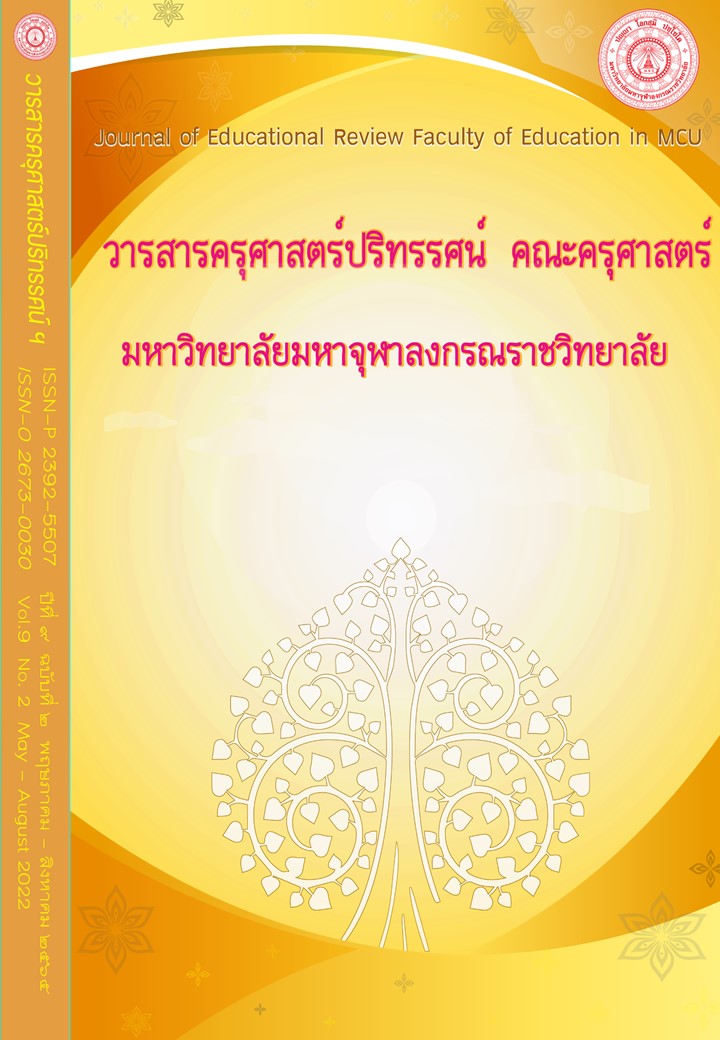GUIDELINES FOR THE DEVELOPMENT OF DIGITAL LEADERSHIP ACCORDING TO THE 4 PRINCIPLES OF BHAVANA OF THE ADMINISTRATORS OF EDUCATIONAL OPPORTUNITY EXPANSION SCHOOLS UNDER OFFICE OF CHONBURI EDUCATIONAL SERVICE AREA 2
Main Article Content
Abstract
The objectives of this research paper were 1) to study the state of leadership in the digital age of school administrators to expand educational opportunities; 2) to study the guidelines for the development of leadership in the digital age of Bhavana IV by school administrators to expand educational opportunities in elementary, and 3) to propose guidelines for developing leadership in the digital age according to Bhavana IV of school administrators to expand educational opportunities Chonburi Primary Educational Service Area Office 2 is an integrated research method, namely 1) quantitative research, using a questionnaire, a sample group of 234 teachers of the Opportunity Expansion School was used. The data were analyzed by statistics such as frequency, percentage, mean, standard deviation, and 2) qualitative research. Conducted interviews with 7 key informants. Data were analyzed by content analysis. Results of the research showed that 1) the digital era leadership of school administrators expanded educational opportunities. Office of Chonburi Primary Educational Service Area 2, in overall and in each aspect, it was found that the level of practice was at a high level. 2) Guidelines for developing leadership in the digital era according to Bhavana IV of school administrators to expand educational opportunities in elementary school. It is the development of leadership in the digital age in 5 aspects by integrating Bhavana IV which is the Dharma principles that are suitable for the development of administrators, namely Kayabhavana, Silabhavana, Cittabhavana, and Panyabhavana. 3) Guidelines for developing leadership in the digital era according to Bhavana IV principles of School administrators expand educational opportunities, Chonburi Primary Educational Service Area Office 2 consisted of 1) Visionary leadership as a role model for others, making them look and see as an example; 2) Leadership in change is courageous and open, dare to face the truth Pioneers encourage innovation in schools; 3) Information technology leadership is a role model in the use of information technology and communication with social responsibility; 4) Inspirational leadership is a role model for self-domination, people domination, and dominate the job; 5) Support leadership is the one who keeps the spirit of the team alive in continuous operation.
Article Details

This work is licensed under a Creative Commons Attribution-NonCommercial-NoDerivatives 4.0 International License.
ทัศนะและความคิดเห็นที่ปรากฏในบทความในวารสารฉบับนี้ถือเป็นความรับผิดชอบของผู้เขียนบทความนั้นเพียงผู้เดียว และไม่ถือเป็นทัศนะและความรับผิดชอบของกองบรรณาธิการ
กองบรรณาธิการขอสงวนสิทธิ์ในการคัดเลือกบทความลงตีพิมพ์และจะแจ้งให้เจ้าของบทความทราบหลังจากผู้ประเมินบทความตรวจอ่านบทความแล้ว
ต้นฉบับที่ได้รับการตีพิมพ์ในวารสารครุศาสตร์ปริทรรศน์ คณะครุศาสตร์ มหาวิทยาลัยมหาจุฬาลงกรณราชวิทยาลัย ถือเป็นกรรมสิทธิ์ของคณะครุศาสตร์ มหาวิทยาลัยมหาจุฬาลงกรณราชวิทยาลัย ห้ามนำข้อความทั้งหมดหรือบางส่วนไปพิมพ์ซ้ำ เว้นเสียแต่ว่าจะได้รับอนุญาตจากมหาวิทยาลัยฯ เป็นลายลักษณ์อักษร
References
กระทรวงศึกษาธิการ. (2553). แนวทางการพัฒนาระบบการประกันคุณภาพภายในของสถานศึกษาตามกฎกระทรวงว่าด้วยระบบ หลักเกณฑ์ และวิธีการประกันคุณภาพการศึกษา. กรุงเทพมหานคร: โรงพิมพ์ชุมชนสหกรณ์การเกษตรแห่งประเทศไทย.
จิรพล สังข์โพธิ์ และคณะ. (2560). ภาวะผู้นำในการบริหารยุคดิจิทัล : องค์การไอทีและองค์การที่เกี่ยวข้องกับไอทีในเขตกรุงเทพมหานครและปริมณฑล. กรุงเทพมหานคร: วิทยาลัยนวัตกรรม มหาวิทยาลัยธรรมศาสตร์.
จิรพล สังข์โพธิ์ และคณะ. (2560). ภาวะผู้นำในการบริหารยุคดิจิทัล: องค์การไอทีและองค์การที่เกี่ยวข้องกับไอทีในเขตกรุงเทพมหานครและปริมณฑล. กรุงเทพมหานคร: วิทยาลัยนวัตกรรม มหาวิทยาลัยธรรมศาสตร์.
ชัยยนต์ เพาพาน. (2560). ผู้บริหารสถานศึกษายุคใหม่ในศตวรรษที่ 21. แหล่งที่มา https://www.conference.edu.ksu.ac.th/file//20160809_2488101126.pdf สืบค้นเมื่อ 16 ต.ค. 2560.
ธานินทร์ ศิลป์จารุ. (2551). การวิจัยและวิเคราะห์ข้อมูลทางสถิติด้วย SPSS. กรุงเทพมหานคร: พริ้นติ้งแมสโปรดักส์.
พระพรหมคุณาภรณ์ (ป. อ. ปยุตฺโต). (2541). พจนานุกรมพุทธศาสตร์ ฉบับประมวลธรรม. พิมพ์ครั้งที่ 17. กรุงเทพมหานคร: โรงพิมพ์มหาจุฬาลงกรณ์ราชวิทยาลัย.
พระพุทธินันทน์ บุญเรือง. (2551). การพัฒนาทรัพยากรมนุษย์แบบยั่งยืนตามหลักพระพุทธศาสนา. วิทยานิพนธ์พุทธศาสตร์มหาบัณฑิต. มหาวิทยาลัยมหาจุฬาลงกรณราชวิทยาลัย.
สุชญา โกมลวานิช. (2563). องค์ประกอบของภาวะผู้นำดิจิทัลของผู้บริหารสถานศึกษา สำนักงานเขตพื้นที่การศึกษามัธยมศึกษาเขต 23. การประชุมวิชาการเสนอผลงานวิจัยระดับบัณฑิตศึกษาแห่งชาติ ครั้งที่ 21 ณ มหาวิทายาลัยขอนแก่น.
สุนันทา สมใจ และวิชุดา กิจธรธรรม. (2561). การบริหารการศึกษาด้วยภาวะผู้นำทางเทคโนโลยี. วารสารวิทยาลัยดุสิตธานี. 12(1). 350-363.
อัขราธร สังมณีโชติ. (2550). คุณลักษณะของผู้บริหารสถานศึกษาที่พึ่งประสงค์ของชุมชน. วิทยานิพนธ์ศึกษาศาตรมหาบัณฑิต. มหาวิทยาลัยศิลปากร.


